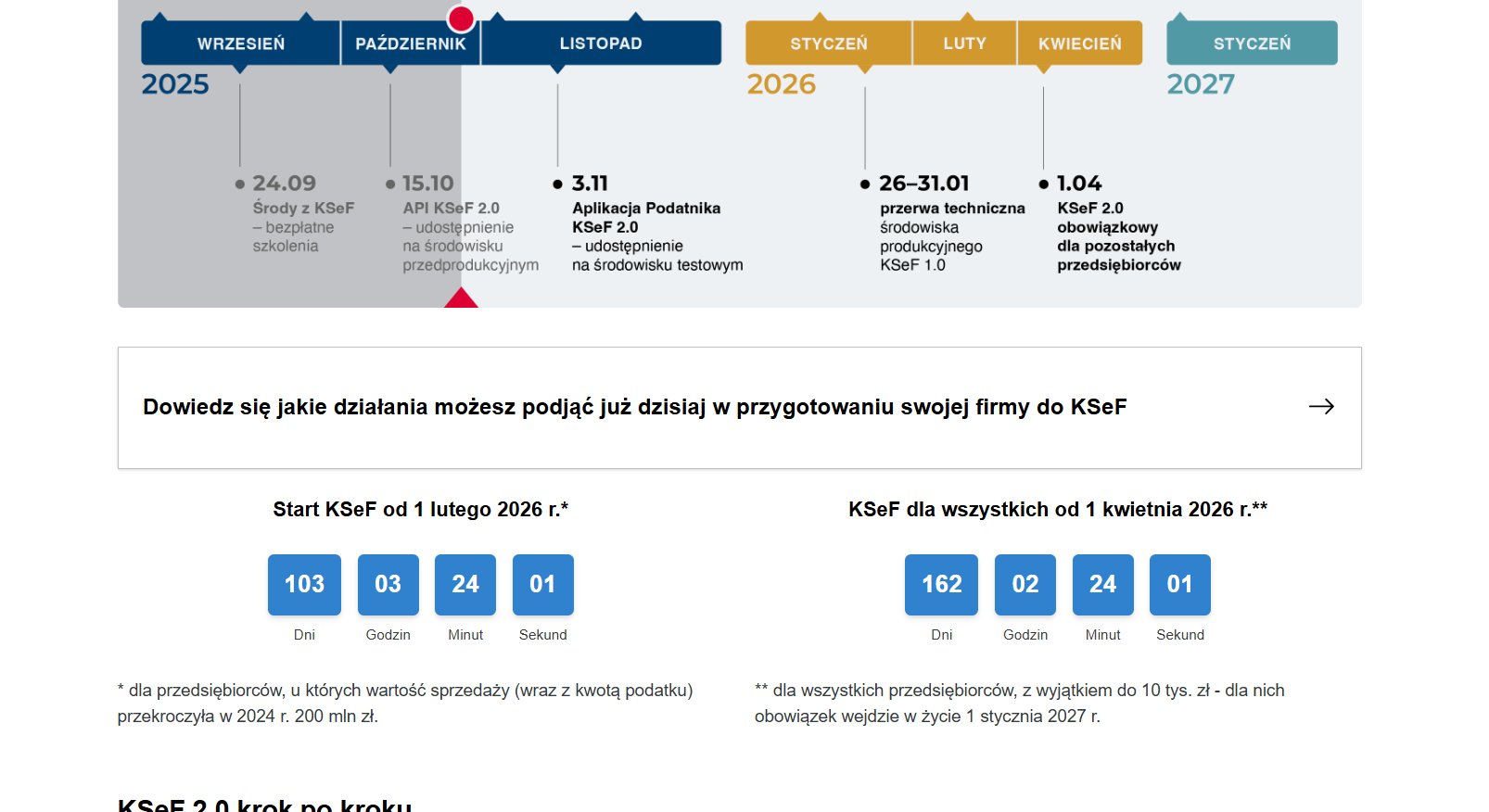100 Days Until the Big Change. Accountants Are Terrified, and the Ministry Is "Losing a Million Taxpayers"

- Starting February 1, 2026, every business will be able to receive e-invoices from the National Tax Office (KSeF). On the same day, the obligation to issue invoices will apply to the largest companies, i.e., those with a turnover exceeding PLN 200 million in 2024.
- From April 1, 2026, others will join, regardless of their legal form.
- There is a transitional period until the end of 2026, during which invoices can be issued outside the KSeF, provided that the total sales on such invoices in a given month do not exceed PLN 10,000 gross. After this limit is exceeded, documents are issued in the KSeF.
- An e-invoice in KSeF is not a PDF, but an XML file in an appropriate structure.
- Correct Tax Identification Numbers (NIPs) are key to operating the system. An incorrectly entered number can cause an error that the system won't notify the invoice issuer of.
- 100 days before the mandatory implementation of the system, only 3.5% of accountants declare their full readiness to take on new responsibilities related to the KSeF.
- Most accountants are afraid of unintentional errors, as well as system failures and glitches.
100 days before the new regulations under the National e-Invoice System Act come into force (February 1, 2026), almost half of accountants (47.5%) cannot clearly state whether they are prepared for the upcoming revolution, and almost a third say they are not . Only 3.5% of accountants declare they are fully prepared for the arrival of the National e-Invoice System, according to the latest study, "Accountants and Enterprises Facing the National e-Invoice System," conducted by SW Research on behalf of fillup k24.
What are accountants most afraid of in connection with KSeF?Accountants, who are generally among the most knowledgeable people in the company about legal and tax regulations, are most concerned about technical problems , including system failures , lack of stability in KSeF operations, or difficulties with integrating accounting systems with KSeF.
In addition, there is the fear of being held liable for errors in the system that are not attributable to them , as well as for structured invoices issued in the new system.
With the implementation of new obligations related to KSeF, some entrepreneurs will certainly transfer the responsibility for any errors to their accountants.
Meanwhile, as Monika Piątkowska, tax advisor at fillup.pl and e-pity.pl, reminds us, issuing invoices on behalf of a client is not only about helping with formalities, but also about the personal criminal and fiscal risk of the accountant.
- Before accounting offices agree to such cooperation, they should carefully consider where their role ends and their responsibility for someone else's business begins - advises Piątkowska.
Who will have to implement the National Security Fund? A difference of one million taxpayers.Why are accountants and entrepreneurs concerned about the KSeF? According to Leszek Lewandowicz, secretary of the board of the Main Association of Accountants in Poland (SKwP), the regulations, which will affect approximately 3 million taxpayers , and not just entrepreneurs, as the Ministry of Finance incorrectly states on its website, are very complicated.

- Many additional problems will come to light when taxpayers start to make it mandatory to use the KSeF system - says Lewandowicz.
In his opinion, the "problems" will begin when it is determined who is the "taxpayer" obliged to issue and receive invoices through KSeF.
According to the VAT Act, the concept of "taxpayer" is much broader than that of "entrepreneur" and includes, among others, local government units, farmers, some non-governmental organizations, and individuals earning income from private rentals. Some of these taxpayers benefit from VAT exemptions and are not on the White List or even lack a Tax Identification Number (NIP), which is required to issue an invoice using the National Taxpayer Registration System (KSeF), explains the accounting expert.
In numbers – as our interlocutor estimates – there are 1 million more taxpayers who will have to implement the KSeF than entrepreneurs alone.
In addition, KSeF may apply to any taxpayer with a Tax Identification Number (NIP) from February 1, 2026.
- The regulations provide for a phased issuance of invoices through KSeF – i.e. until the end of 2026, but no transitional periods have been introduced for receiving invoices from KSeF, so taxpayers should ensure that they can receive invoices from KSeF from the very beginning – warns our interlocutor.
Costly mistakes. The system won't point them out.These aren't the only "stairs" to overcome. Starting February 1st, for many companies, the KSeF will become the sole point of reference for payments and proper recordkeeping. Meanwhile, whether an invoice appears on the contractor's side depends primarily on the correct data on the e-invoice.
The most important thing is the buyer's Tax Identification Number (NIP) entered in the correct field. This is the equivalent of the delivery address in the KSeF system, and the system uses it to link the document to the customer's account. If the NIP is omitted or entered in the wrong field, the invoice will not be visible to the recipient and they will not pay for it, explains Piotr Juszczyk, Chief Tax Advisor at inFakt.
The matter is further complicated by the fact that the person issuing the invoice has no confirmation from the system that it has reached the correct recipient. Invoices with incorrectly entered Tax Identification Numbers are sent to the National Tax Administration Fund (KSeF) and... into the void. This is not the only such case.
When issuing an invoice to a consumer who doesn't have a Tax Identification Number (NIP), the document may be sent to the KSeF (National Tax Identification Number) by the seller, but it won't be assigned to the recipient's account. The consumer won't "collect" the invoice at the KSeF; a visualization (PDF or printout) must be provided. The visualization should have a corresponding QR code, Juszczyk explains.
He adds that the situation is similar for foreign entities without a Polish Tax Identification Number (NIP). An invoice can be issued through the National Tax Identification Number (KSeF), but the document must still be forwarded to the contractor outside the system.
It will also not be possible to attach any attachments to structured invoices issued in KSeF – e.g. waybills – they must also be sent outside the system.
Many tax experts, including Professor Witold Modzelewski, lawyer, academic lecturer, tax advisor and head of the Institute of Tax Studies, believe that entrepreneurs will face difficult times in connection with the KSeF: mess, chaos and mistakes that are difficult to undo.
wnp.pl


